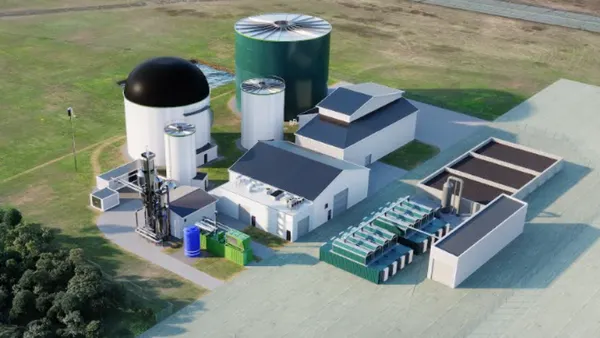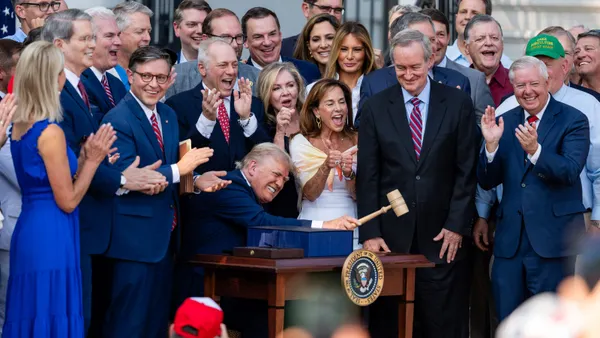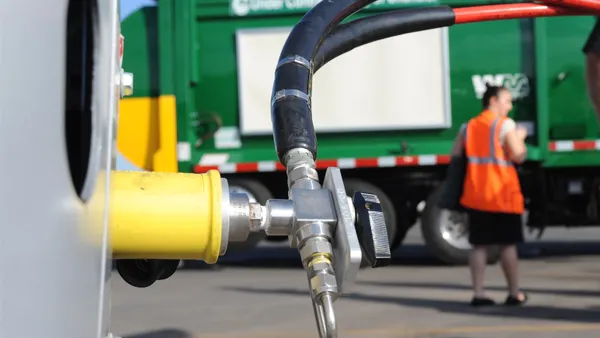Dive Brief:
- The waste industry may be somewhat insulated from any new tariffs on steel and aluminum, according to Stifel analyst Michael E. Hoffman. "Needless to say that we buy a lot of trucks," Hoffman said during a keynote session at SWANApalooza in Denver. "If this were going to go into effect tomorrow, it's pretty much a non-issue in the context of truck-buying this year." Container and truck purchases, he said, were essentially front-loaded and rising metal prices would not materially hit companies until 2019.
- Casella Waste Systems' earnings call came after the tariff announcement, unlike other companies in the space. CEO John Casella said it was "too early to tell" the full effects of the tariffs, but the company had little "exposure" because capital orders for trucks and containers were front-loaded. Covanta CEO Steve Jones said during his company's earnings call that tariffs "could improve demand" for the company's recovered metal products. The company declined to comment further when asked.
- Vice President of the National Recycling Coalition (NRC) Dave Keeling told Waste Dive in an email the tariffs could be a positive for municipal recycling, "If the tariff programs results in the increased demand for steel scrap and the resumption of production at [closed] steel mills." Keeling also works for the Steel Recycling Institute. The National Waste and Recycling Industry did not take a position on the tariffs, but when asked for comment said that the industry would "do its part" to meet domestic manufacturing needs.
Looking forward to 3:30 P.M. meeting today at the White House. We have to protect & build our Steel and Aluminum Industries while at the same time showing great flexibility and cooperation toward those that are real friends and treat us fairly on both trade and the military.
— Donald J. Trump (@realDonaldTrump) March 8, 2018
Dive Insight:
While the tariffs would likely increase demand for domestic steel and aluminum, which could increase demand for recovered metals from MRFs and WTE facilities, the very suggestion of their implementation has sparked talk of retaliation on products from the U.S. And there's reason to think retaliatory measures could continue.
"If anyone in the waste industry was hoping China was going to back off the waste ban, the Trump Administration's imposition of tariffs on steel and aluminum should dissuade them from that unrealistic dream," David Biderman, CEO of the Solid Waste Association of North America previously told Waste Dive in an email.
While the big industry players aren't saying much publicly about their thinking and strategy about China and the scrap trade, it does appear those topics are being seriously considered. Casella, for example, said in its yearly Securities and Exchange Commission (SEC) filings that China's decision to not issue import licenses for mills to bring in recycled material could "have a significant impact on our business."
Waste Management, too, acknowledged further action from China could "have a material adverse effect on the profitability" of its recycling operations. Waste Management did not respond to a request for further comment.
As Biderman suggested, it is entirely plausible that China, like the European Union, will plan punitive actions to rebuke Trump's proposed tariffs on steel and aluminum. It is also unlikely that China would roll back import restrictions at a time when the U.S. is enacting its own import restrictions.
Covanta does stand to reap some benefit from any imposed tariffs, as do other waste-to-energy companies that could see an increased demand for recovered metals (Wheelabrator and Covanta both declined to comment). However, Covanta said in its own filing that any policy changes by the Trump administration could create "changes to social, political, regulatory and economic conditions in the United States," and that the company cannot predict any impact of those changes. "It is likely that some policies ... will benefit us and others will negatively affect us."
The bottom line is that outcomes of trade policy are hard to predict. Demand for recovered metals in the U.S. will likely increase as the cost of steel and aluminum increase from the tariffs. But it is unclear how other countries may react to import restrictions in the U.S., and whether those restrictions target scrap material that is typically recycled.
Perhaps Hoffman, speaking at SWANApalooza, summed it up best.
"At the end of the day, who knows," he said. "This administration has proved itself to be nothing if a little bit bombastic about the way it starts dialogue, and then you find yourselves in different ends, not often as extreme as the initial opening comment."









